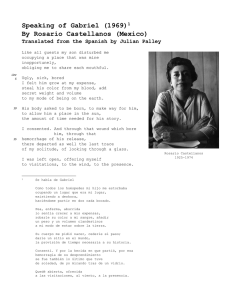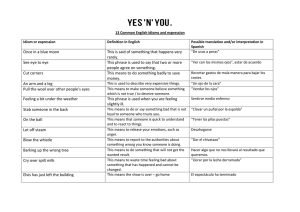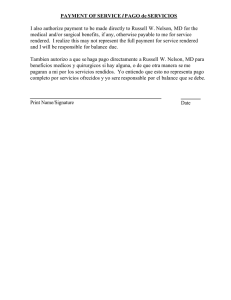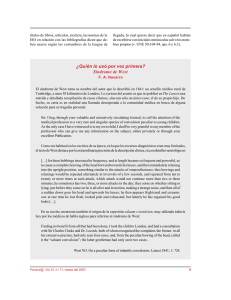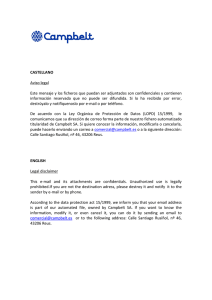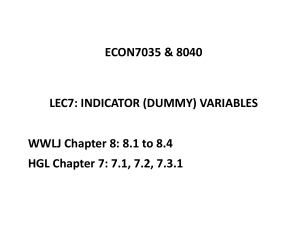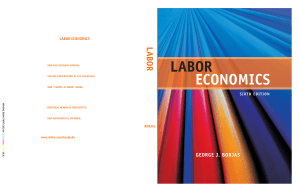Supreme Court ruling means mom`s life or death
Anuncio
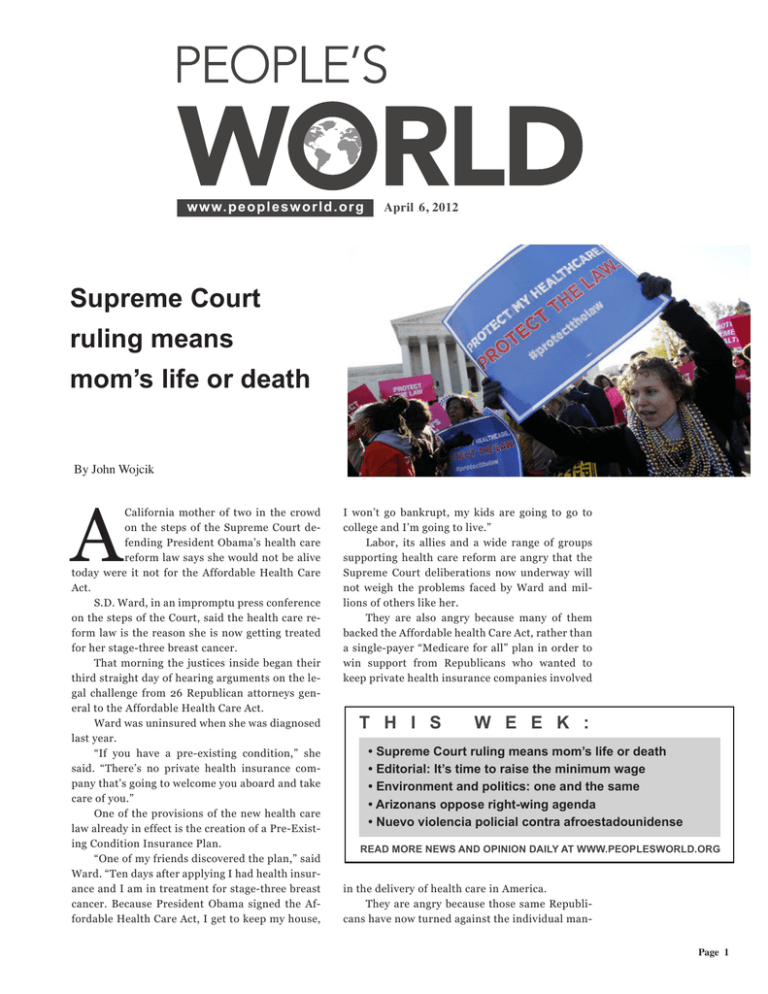
www.pe oplesworl d . o r g April 6, 2012 98 Supreme Court ruling means mom’s life or death By John Wojcik A California mother of two in the crowd on the steps of the Supreme Court defending President Obama’s health care reform law says she would not be alive today were it not for the Affordable Health Care Act. S.D. Ward, in an impromptu press conference on the steps of the Court, said the health care reform law is the reason she is now getting treated for her stage-three breast cancer. That morning the justices inside began their third straight day of hearing arguments on the legal challenge from 26 Republican attorneys general to the Affordable Health Care Act. Ward was uninsured when she was diagnosed last year. “If you have a pre-existing condition,” she said. “There’s no private health insurance company that’s going to welcome you aboard and take care of you.” One of the provisions of the new health care law already in effect is the creation of a Pre-Existing Condition Insurance Plan. “One of my friends discovered the plan,” said Ward. “Ten days after applying I had health insurance and I am in treatment for stage-three breast cancer. Because President Obama signed the Affordable Health Care Act, I get to keep my house, I won’t go bankrupt, my kids are going to go to college and I’m going to live.” Labor, its allies and a wide range of groups supporting health care reform are angry that the Supreme Court deliberations now underway will not weigh the problems faced by Ward and millions of others like her. They are also angry because many of them backed the Affordable health Care Act, rather than a single-payer “Medicare for all” plan in order to win support from Republicans who wanted to keep private health insurance companies involved t h i s w e e k : • Supreme Court ruling means mom’s life or death • Editorial: It’s time to raise the minimum wage • Environment and politics: one and the same • Arizonans oppose right-wing agenda • Nuevo violencia policial contra afroestadounidense read more news and opinion daily at www.peoplesworld.org in the delivery of health care in America. They are angry because those same Republicans have now turned against the individual manPage 1 Republicans have now turned against the individual mandate they once supported in order to kill health care reform altogether. date they once supported in order to kill health care reform altogether. Yesterday potential Supreme Court swing voting justices, asked questions in the first hours of oral arguments that, by their skeptical nature, buoyed Republican opponents of reform. “Do you not have a heavy burden of justification,” Justice Kennedy asked Solicitor General B. Verrilli Jr., “to show authorization under the Constitution?” But later in the day Kennedy asked questions that made supporters of the law happier. He seemed to accept an argument critical to the Obama administration’s case: that people who don’t buy health insurance are still in the healthcare market, because they will need care at some point. “They are in the market in the sense that they are creating a risk that the market must account for,” Kennedy said. Prior to that some conservative justices had said that while Congress has the power to regulate interstate commerce it di not have the power to create such commerce for the purpose of regulating it. Some of the Republican-type partisanship coming from other conservative justices, however, led observers to believe that conservatives on the court, as was the case in the Citizens United ruling and in the ruling where they gave an election to George Bush over Al Gore, simply don’t care how much they damage the reputation of the Court, as long as the Right Wing prevails. “If the Affordable Care Act goes down - especially if it suffers the same schismatic 5-to-4 blow sustained by the McCain-Feingold campaign finance law in the Citizens United case,” wrote Politico today, “critics will accuse the Roberts Court of rigging the game and covering their power play with constitutional doublespeak. The case is also a critical test of Robert’s role as the leader of his own court: In decades past, chief justices have labored mightily to secure something approaching consensus on major decisions.” John Wojcik is PW Labor Editor. It’s time to raise the minimum wage By PW Editorial Board T Raising the minimum wage is vital to sustaining an economic recovery and giving workers the buying power to sustain their families, pay rent and live a decent life. he federal minimum wage is now $7.25 per hour. If you work all year without layoff or penalty, and get a full tax refund, you will have earned $14,500. The federal poverty level for a single individual is $11,170. For 2 people, or a pregnant woman, the federal poverty level is $15,130. So, a couple, never mind a family, is either suffering terribly, or tempted to work in the informal illegal economy to survive. But its worse than that. Consider a recent study of housing costs measured against the minimum wage. The Out of Reach project’ s report calculates the amount of money a household must earn to afford a rent at the area’s Fair Market Rent, based on a standard of paying 30% of income. From these calculations the hourly wage also called the “housing wage” - a worker must earn to afford a two-bedroom unit is derived. In the wake of the recent depression, with the death of Bush’s “ownership society”, the study shows more households are forced to choose renting over home ownership. Consequently the demand for rental housing is surging, pushing “fair market rents” upward and vacancies down. For low income households www. p eo p l esw o rld .o r g and those on fixed incomes finding an affordable, decent apartment is incredibly challenging. Of course the hours - even when calculated based on 30% of income for housing - do not capture equally dire measurements of minimum wage workers’ ability to meet the “fair market prices” of the clothing, food, education, or health care, or other services their families need. The pressure on young workers is enormous, particularly considering the push by Republicans for a youth sub-minimum wage and rescinding child labor laws. Despite claims of economic recovery heard recently, median weekly worker income for most months of the past two years, just like most years of the past 35 years, is either flat, or less. When you hear the stories of suffering and peril that accompany all minimum wage families, and some pompous Faux News economist opines that raising the minimum wage will only “cost jobs”, do not ask for whom the bell tolls: It tolls for thee, as John Dunne suggested. It is way past time that the minimum wage be raised. In fact raising the minimum wage is vital to sustaining an economic recovery and giving workers the buying power to sustain their families, pay rent and live a decent life. Page 2 Environment and politics: one and the same By Blake Deppe C apitalism is fundamentally incapable of dealing with climate change.” These were the words of microbial ecologist Steve McCallister, when asked what the current political atmosphere meant for environmental concerns - and for the future in relation to global warming. What he had to say highlighted the direct ties between political and environmental activism. McCallister, 28, is a doctoral candidate at the University of Oregon in Eugene, Ore. and a member of the American Federation of Teachers Local 3544, in which he is a shop steward for biology professors. His doctoral thesis is on how methane gas (a major contributor to global warming) is produced, and includes dissertation research on its correlation to peat moss in Michigan. “There’s contamination hanging on in the Gulf,” McCallister said. “And it’s the deep stuff that will be a big problem, maybe for ten years or more; damage has been done to microscopic life forms at the very bottom. It’s ‘sleeping contamination,’ - and it can be ‘awakened’ by major events - storms, shifts in the earth, for instance - causing pollutants to be reintroduced to areas previously thought to be cleaned up.” As for how long it might take for the Gulf to be entirely pristine again? “Decades,” he offered. “Maybe longer.” Getting to the root of that problem, McCallister began talking about peak oil, which is a term that refers to “the point at which industrial society reaches its maximum productive capacity,” essentially going over the ‘half-way marker’ on the world’s oil. The truth is, he said, oil production “is not going to give us energy independence.” The bottom line, he said, is that the current capitalist system in the U.S. (unwilling to pursue green energy, as it doesn’t suit immediate corporate interests) just won’t cut it. The solution starts with, “ending this notion www. p eo p l esw o rld .o r g of corporate personhood,” he explained. “They have to be regulated.” McCallister sees replacing capitalism with a socialist system as the key to saving the planet. “In a socialist system, you can plan for the long range and put human needs first.” The labor movement would play an important role in making that happen, he felt. In response, this reporter posed to him, as an example, a recent dilemma on that front: The proposed - but delayed - Keystone XL project was championed by some unions as a job creator. Yet, it served as a source of outrage for environmental activists. Given that current environmental disruption is a key political problem, could unions and environmentalists work together for a single goal that is beneficial to all? McCallister thought so. However, “it’s gonna require a level of class consciousness on the part of trade unionists to see eye to eye with environmentalists; they have to see outside the box of capitalism, and understand that short term sacrifices have to be made to achieve the ultimate goal.” But even so, he added, there are ways already in which union members and environmentalists can unite: the development of green jobs is a key in doing that, he said. “We need to join together,” said McAllister. “We need to declare war on climate change.” Capitalism is fundamentally incapable of dealing with climate change. Page 3 local news L o ca l c o n t ac t [email protected] Arizonans oppose right-wing agenda Special to People’s World A new statewide poll released today shows Arizonans, including self-identified Republicans, overwhelmingly oppose the extreme legislative agenda being pushed by lawmakers at the Statehouse, particularly measures attacking teachers, nurses and other public service workers who keep communities safe and strong. The poll showed Arizonans overwhelmingly want legislators to focus on creating jobs and improving education. The poll which had a majority of respondents selfidentifying as Republicans - also found that only 29 percent of Arizonans approve of the job legislators are doing for them, a finding that shows voters see their lawmakers as extreme and out of touch. “This poll confirms what we already knew: Arizonans are tired of partisan political games that only benefit special interests like the Goldwater Institute and Arizona’s 1 percent,” said John Loredo, who is working with the Arizona Working Families Coalition and is the former Arizona House Minority Leader. “Legislators can either focus on job creation and improving education or face the wrath of voters in November by continuing to push these unpopular, overreaching policies that hurt working families and our communities.” The release of the poll comes a day after Arizonans delivered over 20,000 petitions, postcards and letters to Senators opposing a bill that destroys personnel protections and institutes political cronyism, and other measures that do nothing to create jobs and only put families and communities at risk. Though the poll shows job creation is the number one priority for Arizonans, reports from earlier this month show that the Senate Economic Development and Jobs Creation Committee had only met once since January and heard only three bills. www.p eo p l esw o rl d .o r g Emerge nuevo caso de violencia policial contra afroestadounidense Por Prensa Latina L os patrulleros involucrados en la muerte del joven afroestadounidense Kendrec McDade incumplieron ordenanzas elementales del Departamento Policial de Pasadena (DPP), California, admitieron hoy autoridades institucionales. Trascendió que Jeffrey Newlen y Mathew Griffin nunca activaron el sistema de grabación de video de sus carros en el proceso de detención de McDade, quien fue acribillado a balazos en un callejón la medianoche del 24 de marzo último. Este incidente, en que dos uniformados blancos disparan contra un adolescente negro, incrementó las tensiones raciales en el sur de Estados Unidos, ya conmovido por el asesinato de Trayvon Martin, en Orlando, la Florida, el pasado 26 de febrero. Newlen y Griffin alegaron que esa noche respondieron a un pedido de auxilio de un sujeto a quien supuestamente dos hombres armados le robaron una computadora. McDade, de 19 años, recibió varios impactos en el pecho y en el momento del incidente solo cargaba un reproductor de audio digital. Se trataba de un Código Clave 3, utilizado en robos a mano armada, y el protocolo reglamentario es activar las secuencias de filmación y las sirenas, reconoció el jefe policial del DPP, Phillip Sanchez. Desconocemos la razón por la cual no se cumplieron esos requisitos, agregó el funcionario. Líderes de la comunidad afroamericana señalaron que con esa maniobra algunos agentes intentan cubrir evidencias y rastros de procedna t i o na l imientos inadecuados. Varios casos interpretados como delitos con matices racistas salieron a flote durante el último mes en Estados Unidos, encabezados por el homicidio del adolescente negro en el barrio floridano de Sanford. Martin murió por un disparo en el pecho que le propinó un vigilante policial. El guardia nocturno alegó que había actuado en defensa propia y quedó libre. Se conoce que el joven iba desarmado y hablaba por teléfono con su novia a la hora del suceso. El hecho provoca protestas en grandes ciudades norteamericanas y denuncias públicas de personalidades como el excandidato presidencial Jesse Jackson, el reverendo Al Sharpton, el cineasta Spike Lee y el congresista demócrata Bobby Rush. En la misma etapa el Departamento de Policía de Los Angeles, California, reconoció por primera vez en 35 años la existencia de racismo entre sus oficiales y en contra de ciudadanos en Estados Unidos. Una investigación interna encontró culpable al patrullero Patrick Smith, con 15 años de servicio, de aplicar un perfil racial a la hora de aplicar multas de tránsito. Igualmente en Chicago integrantes de la comunidad afroamericana se movilizaron para protestar por la muerte de una joven negra de 22 años por balazos de un policía local. Rekia Boyd falleció luego que un patrullero disparó contra un sujeto que conversaba a pocos metros de ella y que supuestamente esgrimió una pistola. c o n t ac t Editorial: (773) 446-9920 Business: (212) 924-2523 Email: [email protected] Page 4

